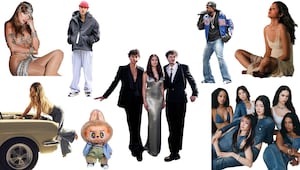Trust Me, Your Likes Don't Define You
Cosmo’s Mel Evans discovers the hidden dangers of social validation.

People who hit like several times a day - 52 percent born in the ’90s, 45 percent born in the ’80s, 24 percent baby boomers.
So how many likes did you get yesterday? I got 81 *swishes hair*. It was a shot of graffiti, and my most-liked Instagram post so far. Go figure. And damn, it feels good. You see, even though I’m not an ‘influencer’ or even someone with a brag-worthy number of followers, I crave the feeling that little love heart or thumbs-up brings when I refresh my feed.
But it’s killing my vibe. And I’m far from alone: social validation is here to wrap your sense of self, in your phone and in your home. Fact: 52 percent of those who are making the Likes rain on social media are born in the ’90s, and 45 percent in the ’80s. I’m going to guess you’re one of those; I definitely am. And curating the perfect feed is hampering my efforts at being a functioning adult. Finding the exact right degree of contrast on a photo or editing a Facebook post multiple times if it doesn’t hit the right balance of wit, charm, and pizzazz I thought it did 60 minutes prior is now my life. As a writer, coming up with the perfect caption could determine whether I post a beautiful image at all, and I’ll think nothing of deleting an Instagram post altogether if I don’t get more than 10 Likes. It’s a cruel world, and I’m scrolling down the river without a paddle.
This psychological thirst for social validation ain’t new, that’s for sure. It’s always been around in one form or another, but the way it’s totally infiltrating our lives in the digital age is concerning.
“We’ve always needed social approval; it’s hard-wired into our brains,” explains Melbourne-based clinical neuropsychologist Ash Nayate. “Once upon a time it was having a big house, the best car, and tonnes of great shoes. Now it’s changed and evolved to be through social media. If we put a cute picture of ourselves online, it’s going to get a lot of Likes. It’s immediate in how it triggers the reward pathways in our brain. Much the same way as food, chocolate or a text message from the person you’ve had your eye on does.”
However, unlike the cute text you could be waiting days for, I can upload a pic right now (provided it’s post-worthy, of course) and in mere seconds I can be staring at a few Likes—dopamine achieved; endorphins riding high. Even as I type, my fingers slowly gravitate towards my phone, sitting on a pile of papers on my desk. Has someone new liked my most recent photo? Perhaps a friend has posted an ‘LOL’ on my Facebook comment. Nope. No notifications. Sad face emoji. I’ll check again in 10.
“Because social media is at our fingertips and so immediate, we don’t have to rely on someone else to say nice things about us, as once was the case to achieve the same high,” Nayate says. Because who needs other people when you have your likes, right? Chumps.
The 2015 Sensis Social Media Report looked into people’s online habits and what they get up to on our social media accounts. What did they find? Exactly what you’d assume: we’re spending a sh*tload of time on these apps, looking for our next hit. It found we spend an average of eight and a half hours per week on Facebook, 45 percent of us log in as soon as we wake up and most update their accounts to keep their ‘finger on the pulse’.
In a study by authors Joseph Grenny and David Maxfield called Society’s New Addiction: Getting a ‘Like’ over Having a Life, 1,623 people were surveyed about their social media proclivities. Nearly 75 percent admitted to being rude or disconnected because they’re more focused on their phones. 91 percent have seen a tourist miss the enjoyment of a moment by trying to get it on social media—or even acknowledge doing the same thing themselves. Oh, I’ve been there (and I probably posted about it).
Remember Essena O’Neill? The 19-year-old Sunshine Coast model who quit social media last year in a dramatic flurry of tears and media? She said it “ruined” her life and campaigned to change the perception we have of those popular social media accounts. “Everything I was doing was just edited and contrived to get more value and more views,” she explained in a 17-minute video declaring she was saying see-ya to social media. “If you don’t think [social media] is a business, you’re deluding yourself.”
You don’t need to be making money from the machine to earn the feel-good vibes, and the effect it has on real-world happiness is just as damaging.
“Our key finding is that we enjoy these moments less when we’re focused on capturing them, rather than experiencing them,” said Grenny in his study. “Likes are a low-effort way to produce a feeling of social well-being that takes more effort to achieve in the real world. This study is a warning that we are beginning to value virtual pleasure hits more than authentic happiness.”
It becomes a constant need to activate these pleasure centers. You may have first created an account because your friends did, but what starts as a harmless post or two, fast turns into a slippery-slope of validation obsession.
“The thing about a dopamine hit is that it’s very addictive,” says Nayate. “The more we get, the more we want. That’s why social media use can escalate really quickly—it might not even be something we’re conscious of.”
This social validation for the digital age is messing with the relationships big time. I can think of many a situation where I have ignored the person I’m with, be it a boyfriend or a housemate, in order to look for a #throwbackthursday (with the right mix of funny and cute) to post and wow my seven-hundred-and-something Instagram admirers. Oh, how annoying it was to feign interest in their story while at the same time encouraging my brain to nail the right hashtags to elicit Likes from randoms on the other side of the world. It’s like trying to think of a song while another plays in the background—my brain can only do so much, and often it chooses the mindless interactions of ‘social’ media over engaging in real-life, meaningful conversations with those closest to me—literally. Although I’m not proud, I recognise it’s something I’ve got to work on. You know, to make sure I still have real-life pals this time
next year.
“Any form of online connection cannot replace a flesh-and-blood connection,” Nayate says, leaving me feeling like the worst friend in the world. “We become addicted to the rush of validation from someone else. Post something and you might get 100 or 1,000 people liking it, compared to a simple one-on-one conversation that might not be as rewarding for our neural pathways as getting those Likes. How can you say 1,000 random Likes are better than one from your best friend? Social media is taking away our ability to enjoy real-life interaction with our friends.”
In our quest for Likes, we are more connected, yet we are lonelier than ever. We long for the perfect #sunset photo to share across our networks, choosing instead to chase the picture rather than take it in. While our dinner goes cold and our partner sits alone (pissed off, no doubt), we’re filtering our food instead of tasting it. Consider that, if you will, as a wider metaphor.
Think about it—how many concerts have you been to where your view of Your Favourite Band has been obscured by layers of smartphones, held aloft like weird, virtual cigarette lighters of an era past? Punters (myself included, I’ll admit) are more focused on creating the perfect Snapchat to elicit maximum FOMO than just enjoying the performance they’ve paid maximum dosh for.
“We’re not enjoying things anymore,” says Nayate. “People talk about mindfulness and being present, and when we’re watching everything through our phones there is part of our mind thinking, ‘This is going to be a great shot!’”
What’s the antidote? To
relax, says Nayate—but ideally not by scrolling through Instagram or plotting your next Facebook post. And with that advice in mind, I think it’s high time I ditched the phone, cared not for how many people are double-tapping my pics and just started looking at what’s going on around me. For as Ferris Bueller says: “Life moves pretty fast. If you don’t stop and look around once in a while, you could miss it.” What a great quote... I should Tweet that.
more from Life

Which 2025 pop culture moment are you?

Eight cities, eight stories—check out where India’s matcha lovers get their fix

How to survive party season without burning out your body

Is luxury for Gen Z?

The only holiday watchlist you need if you’re not leaving the house

The ultimate gifting list that will make you everyone’s favourite Secret Santa

What does your texting pace say about you?

How to sit at the bar alone and actually meet people instead of just staring at your phone the whole time

Is 2025 the year when romcoms finally got emotional intelligence right?

Why logging off after work still feels like a myth in creative industries
